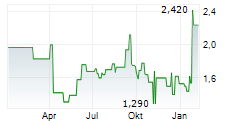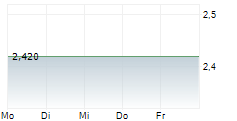- Alignment gained on Phase 2 inclusion/exclusion criteria, primary and secondary endpoints, and study design, including sample size and dosing regimen
- Company expects to begin enrolling patients in Phase 2 in 2H 2025
SAN DIEGO and SUZHOU, China, July 15, 2025 (GLOBE NEWSWIRE) -- Adagene Inc. ("Adagene or the Company") (Nasdaq: ADAG), a company transforming the discovery and development of novel antibody-based therapies, today announced outcomes from its Type B meeting with the United States Food and Drug Administration (FDA). Adagene has received written feedback from the FDA on its clinical development plan to evaluate muzastotug (ADG126) in combination with Merck's (known as MSD outside of the US and Canada) anti-PD-1 therapy, KEYTRUDA® (pembrolizumab: 200 mg, Q3W) in patients with microsatellite stable colorectal cancer (MSS CRC).
ADG126 is a masked, anti-CTLA-4 SAFEbody® that targets a unique epitope of CTLA-4 in regulatory T cells (Tregs) in the tumor microenvironment. ADG126 is currently in phase 1b/2 clinical studies in combination with anti-PD-1 therapy, particularly focused on MSS CRC. To date, over 150 patients have received ADG126, either as monotherapy or in combination with anti-PD-1 therapy. Adagene has completed patient enrollment for the MSS CRC dose expansion cohorts of the ADG126 + pembrolizumab combination (NCT05405595). The phase 2 trial will be conducted primarily to identify which of the two doses of ADG126 will be used in the phase 3 trial.
Key Outcomes from the FDA Type B Meeting
- Patient Population: Future trials will enroll late-line patients with MSS CRC without liver metastases, including those with peritoneal metastasis/involvement.
- Dose and Regimen: Phase 2 will randomize patients to either 10 mg/kg or 20 mg/kg of ADG126 in combination with pembrolizumab, using an induction-maintenance regimen, without cycle limitations of ADG126.
- Phase 2 Trial Design: Approximately 30 patients will be enrolled in each arm of the Phase 2 study, without a requirement for an ADG126 monotherapy arm.
- Phase 3 Trial Design: The FDA agreed with Adagene's proposed standard-of-care (SOC) control arm for the Phase 3 clinical trial and confirmed that an ADG126 monotherapy arm is also not required in the pivotal study.
- Phase 2 Endpoints: The primary endpoint of the Phase 2 trial will be overall response rate (ORR). Secondary endpoints include duration of response (DOR), progression-free survival (PFS), and overall survival (OS).
- Phase 3 Endpoints: The primary endpoint of the Phase 3 trial will be OS. Secondary endpoints will include PFS, DOR and ORR.
"Receiving the FDA's endorsement to explore ADG126 at doses 10 to 20 times higher than other anti-CTLA-4 antibodies, without limitations on treatment cycles, has demonstrated a nearly two-fold increase in ORR from 17% at 10 mg/kg to 29% at 20 mg/kg, while Grade 3 treatment-related adverse events (TRAEs) remain approximately 20% at comparable drug exposures for ADG126 at 10 mg/kg Q3W versus 20 mg/kg Q6W. These results highlight the wide therapeutic index and favorable safety profile we have seen to date in the clinic," said Dr. Marwan Fakih, Professor of Medical Oncology and Therapeutics Research at City of Hope.
Peter Luo, Ph.D., CEO and President of R&D at Adagene added, "Our Phase 1b/2 trial has produced robust dose-dependent efficacy data with a potential best-in-class safety profile, identifying two optimized dose levels for the Phase 2, consistent with Project Optimus. With the FDA's endorsement to advance into the Phase 2 part of the clinical trial, we'd like to thank our strategic partner, Merck, for supplying pembrolizumab to support this exciting randomized dose optimization cohort to identify a single dose to take into Phase 3, a critical step towards registrational trial for FDA approval."
About Adagene
Adagene Inc. (Nasdaq: ADAG) is a platform-driven, clinical-stage biotechnology company committed to transforming the discovery and development of novel antibody-based cancer immunotherapies. Adagene combines computational biology and artificial intelligence to design novel antibodies that address globally unmet patient needs. The company has forged strategic collaborations with reputable global partners that leverage its SAFEbody® precision masking technology in multiple approaches at the vanguard of science.
Powered by its proprietary Dynamic Precision Library (DPL) platform, composed of NEObody, SAFEbody, and POWERbody technologies, Adagene's highly differentiated pipeline features novel immunotherapy programs. The company's SAFEbody technology is designed to address safety and tolerability challenges associated with many antibody therapeutics by using precision masking technology to shield the binding domain of the biologic therapy. Through activation in the tumor microenvironment, this allows for tumor-specific targeting of antibodies in tumor microenvironment, while minimizing on-target off-tumor toxicity in healthy tissues.
Adagene's lead clinical program, ADG126 (muzastotug), is a masked, anti-CTLA-4 SAFEbody that targets a unique epitope of CTLA-4 in regulatory T cells (Tregs) in the tumor microenvironment. ADG126 is currently in phase 1b/2 clinical studies in combination with anti-PD-1 therapy, particularly focused on Metastatic Microsatellite-stable (MSS) Colorectal Cancer (CRC). Validated by ongoing clinical research, the SAFEbody platform can be applied to a wide variety of antibody-based therapeutic modalities, including Fc empowered antibodies, antibody-drug conjugates, and bi/multi-specific T-cell engagers.
For more information, please visit: https://investor.adagene.com.
Follow Adagene on WeChat, LinkedIn and X.
SAFEbody® is a registered trademark in the United States, China, Australia, Japan, Singapore, and the European Union.
KEYTRUDA® is a registered trademark of Merck Sharp & Dohme LLC, a subsidiary of Merck & Co., Inc., Rahway, NJ, USA
Safe Harbor Statement
This press release contains forward-looking statements, including statements regarding the impact of Sanofi's strategic investment and Adagene's relationship with Sanofi; the expected timeframe for funding Adagene's operating plan with current cash and cash equivalents and the proceeds from Sanofi's investment; certain clinical results of ADG126, the potential implications of clinical data for patients, and Adagene's advancement of, and anticipated preclinical activities, clinical development, regulatory milestones, and commercialization of its product candidates. Actual results may differ materially from those indicated in the forward-looking statements as a result of various important factors, including but not limited to Adagene's ability to demonstrate the safety and efficacy of its drug candidates; the clinical results for its drug candidates, which may not support further development or regulatory approval; the content and timing of decisions made by the relevant regulatory authorities regarding regulatory approval of Adagene's drug candidates; Adagene's ability to achieve commercial success for its drug candidates, if approved; Adagene's ability to obtain and maintain protection of intellectual property for its technology and drugs; Adagene's reliance on third parties to conduct drug development, manufacturing and other services; Adagene's limited operating history and Adagene's ability to obtain additional funding for operations and to complete the development and commercialization of its drug candidates; Adagene's ability to enter into additional collaboration agreements beyond its existing strategic partnerships or collaborations, as well as those risks more fully discussed in the "Risk Factors" section in Adagene's filings with the U.S. Securities and Exchange Commission. All forward-looking statements are based on information currently available to Adagene, and Adagene undertakes no obligation to publicly update or revise any forward-looking statements, whether as a result of new information, future events or otherwise, except as may be required by law.
Investor Contacts:
Raymond Tam
raymond_tam@adagene.com
Corey Davis
LifeSci Advisors
cdavis@lifesciadvisors.com



